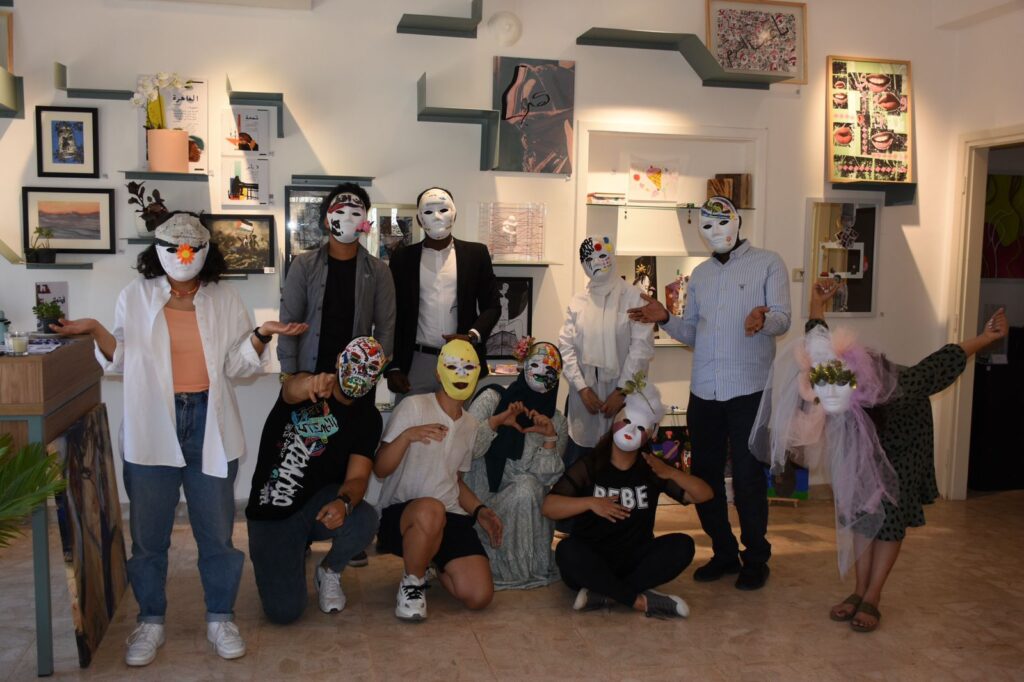Mental health is a topic that not everyone is comfortable talking about with close friends and family. Sharing personal stories of struggle with the rest of the world is even more difficult. But what if you could witness the lives of people and their journey of recovery from mental health conditions through their eyes?
In June 2022, the Child Protection (CP) team of International Medical Corps’ Jordan operations, together with its mental health and psychosocial support (MHPSS) team, launched a mental health and protection campaign—“See Us through Our Eyes”—in collaboration with the Juvenile and Family Protection Department of Jordan. The campaign’s objectives were to decrease the stigma around protection and mental health by highlighting survivor stories and by raising awareness among the community about mental health literacy and the services and support available.


On June 14, International Medical Corps organized a day-long event at Gallery Ras al Ain that brought together people, many of them children, who had faced some form of mental health or protection issue. A video presentation titled “I Am the Hero of My Story” showed the challenges and courage of a child who had suffered different types of abuse. There was a panel discussion by officials from the UN and the health and social development ministries on the state of MHPSS in Jordan. There also were a gallery, a mask workshop and market, and a freeze mob and song.
Attendees included officials from the country’s Juvenile and Family Protection Department, Ministry of Health (MoH), Ministry of Social Development, UNHCR, the German development agency GIZ, and various embassies, donors, international NGOs and community members.
Heroes behind the masks
International Medical Corps facilitated a mask workshop for people who did not feel comfortable in public. Yasmin, who has received MHPSS consultations from us, designed the workshop to reflect on three questions: How do the such people see themselves, how do they believe other people see them and how would they like to be seen? The workshop successfully fostered a team-building spirit among the nine participants. They introduced themselves and worked as a group while reflecting on questions of identity, social interaction and support system.
Ahead of the event, participants worked with International Medical Corps psychologists and CP counselors to highlight stories from their lives through photographs. Most of the stories were on mental health conditions and bullying, and specified stressors and achievements—the former were represented by stones of different sizes and the latter by flowers. Each story had a title and description. Through these photos, the participants shared their mental health and protection experiences and their journey to recovery. International Medical Corps’ team collected 40 such photo stories, and printed, framed and displayed them at the gallery on the day of the event.


In addition, participants and their caregivers put on a crafts bazaar displaying food, hand art made with henna, accessories, handicrafts, cosmetics and art. Fourteen children from our CP center in Al Zarqa governorate presented a freeze mob about bullying.
Colonel Feras Al Rasheed, Director of the Juvenile and Family Protection Department, talked about the importance of mental health and protection services and the role of art in representing the two. Ahmad Jaran, Program Coordinator at International Medical Corps, emphasized the need for MHPSS services and highlighted the organization’s role in providing both MHPSS and protection services in Jordan. “International Medical Corps has 19 mental health clinics, in 11 of 12 governorates in Jordan. We provide MHPSS services to the local community in all its forms,” he explained.
In Jordan, we collaborate with the MoH to provide integrated MHPSS services at primary healthcare centers, utilizing a case management approach through a multidisciplinary team comprising a psychiatrist, mental health nurse, pharmacist, psychologist and case managers. We run six clinics in the Za’atari and Azraq refugee camps, where those in need and their families receive comprehensive MHPSS services and home-based interventions. To strengthen the country’s national mental health policy, we also conduct regular training sessions for our MHPSS team and the MoH staff to help them better detect and provide early interventions.
